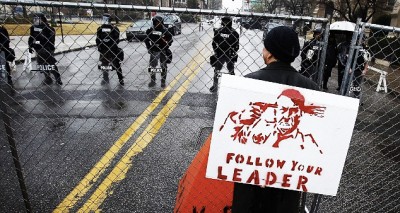“Pre-Emptive Arrest”: An Open Invitation to Tyranny

The FBI has published a document that concludes that “conspiracy theories” can motivate believers to commit crimes.
Considering the growing acceptance of pre-emptive arrest, that is, arresting someone before they can commit a crime that they are suspected of planning to commit, challenging official explanations, such as those offered for the assassinations of John F. Kennedy, Robert Kennedy, and Martin Luther King or the official explanation for 9/11, can now result in monitoring by authorities with a view to finding a reason for pre-emptive arrest. Presidents George W. Bush and Obama created the police state precedents of suspension of habeas corpus and assassination of citizens on suspicion alone without due process. If Americans can be preemptively detained indefinitely and preemptively assassinated, Americans can expect to be preemptively imprisoned for crimes that they did not commit.
As Lawrence Stratton and I explained in our book, The Tyranny of Good Intentions, the historic achievement of forging law into a shield of the people is being reversed in our time as law is being reforged into a weapon in the hands of the government.
The FBI document says that conspiracy theories “are usually at odds with official or prevailing explanations of events.” Note the use of “official” and “prevailing.” Official explanations are explanations provided by governments. Prevailing explanations are the explanations that the media repeats. Examples of official and prevailing explanations are: Saddam Hussein’s weapons of mass destruction, Assad’s use of chemical weapons, Iranian nukes, Russian invasion of Ukraine, and the official explanation by the US government for the destruction of Libya. If a person doubts official explanations such as these, that person is a “conspiracy theorist.”
Official and prevailing explanations do not have to be consistent with facts. It is enough that they are official and prevailing. Whether or not they are true is irrelevant. Therefore, a person who stands up for the truth can be labeled a conspiracy theorist, monitored, and perhaps pre-emptively arrested.
Consider 9/11. No forensic investigation of 9/11 was ever officially conducted. Instead the destruction of the buildings was blamed on Osama bin Laden, and scenarios and simulations were created to support the allegation, not to find the truth. Architects, engineers, scientists, pilots, and first responders on site cannot reconcile the official prevailing explanation with the facts. The scientific and testimonial evidence that they have produced is dismissed as “conspiracy theory.” It is those experts who stand on the evidence who are defined as conspiracy theorists, not those who created the story of Osama bin Laden’s 9/11 conspiracy.
Consider Russiagate. Here we have an alleged conspiracy between Trump and Russia that was the official prevailing explanation. Yet, to believe in the Russiagate conspiracy did not make one a conspiracy theorist as this conspiracy was the official prevailing explanation. But to doubt the Russiagate conspiracy did make one a conspiracy theorist.
What the FBI report does, intentionally or unintentionally, is to define a conspiracist as a person who doubts official explanations. In other words, it is a way of preventing any accountability of government. Whatever the government says, no matter how obvious a lie, will have to be accepted as fact or we will be put on a list to be monitored for preemptive arrest.
In effect, the FBI’s document reduces the First Amendment, that is, free speech, to the right to repeat official and prevailing explanations. Any other speech is a conspiratorial belief that can lead to the commission of a crime.
Every American should be greatly concerned that the government in Washington does not see this FBI document as an open invitation to tyranny, repudiate it, and demand its recall.
*
Note to readers: please click the share buttons above or below. Forward this article to your email lists. Crosspost on your blog site, internet forums. etc.
Dr. Paul Craig Roberts writes on his blog, Paul Craig Roberts Institute for Political Economy, where this article was originally published.

